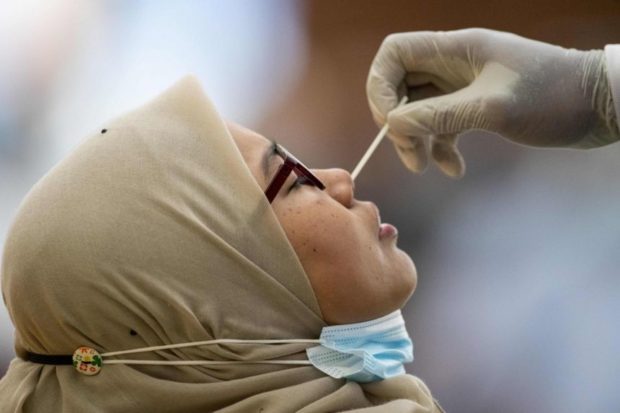Surge in active COVID-19 cases overwhelms Malaysia’s healthcare system

A woman getting her sample taken at a Covid-19 testing centre in Petaling Jaya on Jan 18, 2021. AFP via The Straits Times/Asia News Network
KUALA LUMPUR — Malaysia’s healthcare system has been overwhelmed by months of increasing active Covid-19 cases, forcing many patients to go untreated even as the authorities cut down on testing for close contacts.
The government is now moving to acquire private healthcare resources.
But medical front-liners are already complaining of burnout due to the heavier workload and growing risk with many infected or forced into quarantine, straining the healthcare system further.
Complaints of overwork began to surface last October, when the number of those warded with the deadly coronavirus crossed the 3,000 mark for the first time. Then, front-liners, who spend hours in stifling protective gear daily, complained to the media, albeit anonymously.
Some doctors are now speaking out openly after the total number of active Covid-19 cases multiplied by over a dozenfold to 40,000, far more than the 34,000 beds – only increased from 29,000 in recent weeks – reserved for such patients in public hospitals and quarantine centers.
“I hope whoever reads this can help me, and find me a way out,” Dr Mustapha Kamal posted Friday (Jan 15) on Facebook. He said his transfer to the country’s main Covid-19 facility, Hospital Sungai Buloh, was when “things started to spiral downwards”.
“I see my colleagues fall down, my teammates in and out of quarantine. Most of us had fallen out to burnout,” he said in the post. He claimed his superior had chided him for obtaining medical leave from Psychological First Aid despite the health authorities affirming that the service was open to staff requiring it.
Another physician, Dr Alzamani Idrose, last week complained about the situation in Hospital Kuala Lumpur, saying that critical patients needing ventilators had to be warded in the emergency zone rather than the intensive care unit (ICU).
He was also scathing about those who turned up at the emergency department.
“Without any feeling of guilt and full of pride, you share photos standing less than a meter apart without masks on social media… you give live bullets to the virus to fire at front-liners,” he said.
About two per cent of Malaysia’s 160,000-odd infections comprise medical staff, straining rosters and forcing the Health Ministry to scramble to beef up the ranks with contract hires. After adding 8,000 personnel last year, another 3,500 are expected to join up by the end of the month.
“Hospital Sungai Buloh, for example, is at full capacity. But it still can increase the number of ICU beds from the current 60 to 110. But we need the manpower first,” Health director-general Noor Hisham Abdullah said last Wednesday.
The surge in the number of daily infections, which last Saturday breached more than 4,000 for the first time, pushed the government to declare an emergency on Jan 11. This allowed the authorities to take over private medical facilities and rope in their staff but negotiations between the two sides have dragged on.
The government announced yesterday it would allocate RM100 million (S$32.9 million) towards this initiative, which is expected to take up 10 percent of private hospital beds though the details are still unconfirmed.
For now, with little space left at public facilities, the government has reduced the scope of Covid-19 testing.
Last week, the authorities stopped testing all close contacts of Covid-19 patients, instead taking just 20 samples if the number exposed is under 50. Otherwise, the number of tests would be just 30, or 10 percent of the total close contacts, whichever is lower.
This is despite 46 experts writing an open letter to Prime Minister Muhyiddin Yassin earlier this month calling for more tests as the positive rate has hovered at over eight per cent so far this year, well above the World Health Organization’s five per cent benchmark for effective containment.
In the meantime, many patients have been left to their own devices and tasked with self-quarantine, some without the infamous “pink wristbands” to warn others of their status.
An opposition lawmaker highlighted the case of a woman, Ms Yong, whose family was not contacted by the authorities despite the fact that all six members were infected in the first week of January.
Hospitals refused to take in her elderly father and mother-in-law, who are both 78 and in a bad state. He was stricken with diarrhea, dehydration and had elevated blood pressure.
She finally convinced Hospital Sungai Buloh to admit them but no ambulance came for three days, leaving Ms Yong with no choice but to hire two private ambulances for RM2,000 (S$657).
“After a while, he couldn’t focus and when you talked to him, he’d look through you, blank. When you asked him a question, he wouldn’t answer,” said Ms Yong, referring to her father-in-law, when she criticized hospital staff who took her repeated calls.
For more news about the novel coronavirus click here.
What you need to know about Coronavirus.
For more information on COVID-19, call the DOH Hotline: (02) 86517800 local 1149/1150.
The Inquirer Foundation supports our healthcare frontliners and is still accepting cash donations to be deposited at Banco de Oro (BDO) current account #007960018860 or donate through PayMaya using this link.